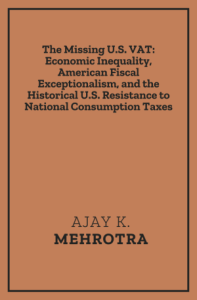This project explores how and why the United States has historically rejected broad-based, national consumption taxes. Nearly all developed countries, and many in the developing world, have some type of comprehensive national consumption tax, frequently in the form of a value-added tax (VAT). In many of these places, national VATs fund a robust amount of social welfare spending. The United States is an exception in its absence of any kind of broad-based, national consumption. This project focuses on the fundamental question: why is there no VAT in the United States?
To address this overall research question, this project explores three key historical periods. The first is the 1920s, when tax theorists in the United States and Germany first began to formulate and propose crude forms of broad-based consumption taxes that might evolve into value-added taxes. The second critical time period is the decades of the mid-twentieth century. During the 1940s, the United States once again seriously considered but rejected broad-based, national consumption taxes aimed at raising revenue for World War II. Similarly, after the war, during the U.S. occupation of Japan, American economic experts designed and implemented a proto-VAT for Japan. The third crucial time period is the 1970s and ’80s. During these decades, American lawmakers considered and even supported a U.S. VAT but eventually withdrew their support or were ousted from political office. At the same time, other developed countries, such as Japan, Australia, and Canada, began to move towards a national VAT.
By focusing on these three key historical periods from a comparative perspective, this project seeks to study how and why the U.S. has failed to adopt a comprehensive national consumption tax like the VAT, and what that might tell us about American views towards taxes and government spending.





